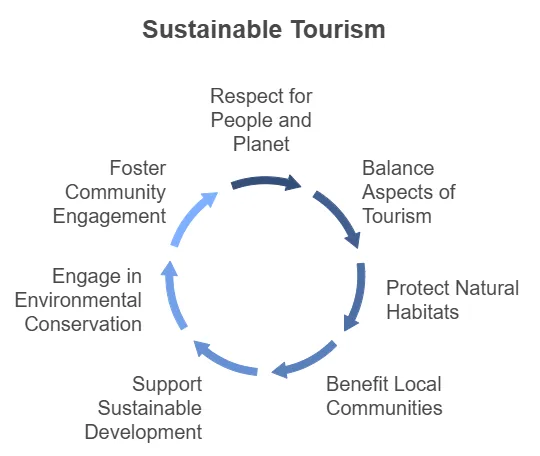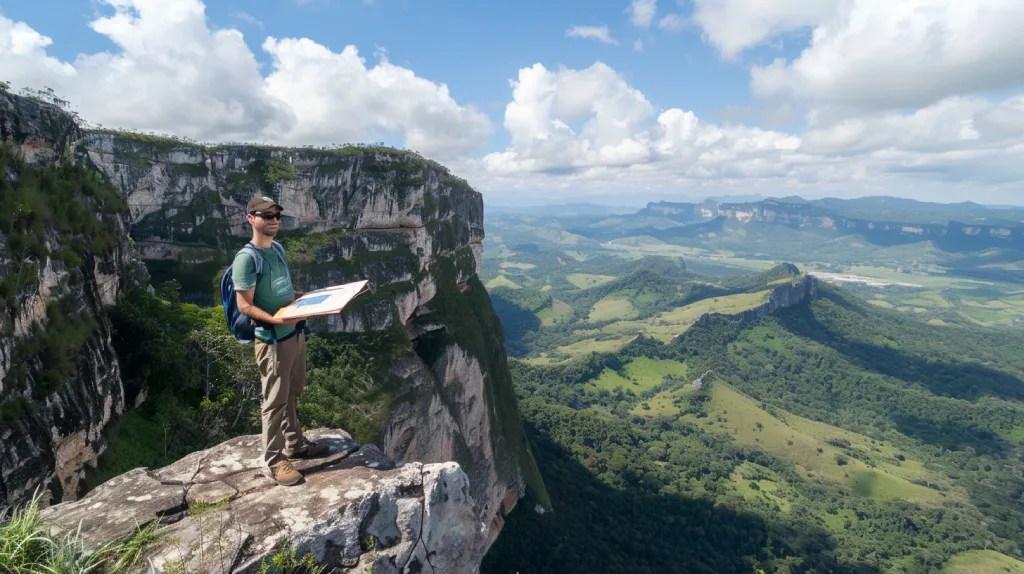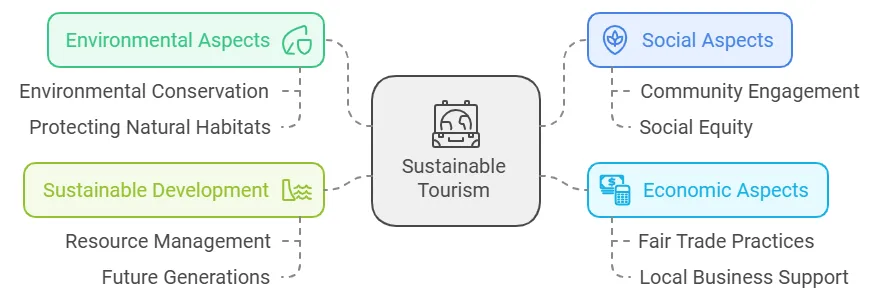Sustainable tourism is about traveling in a way that cares for the places we visit and the people who live there. This form of tourism is based on reducing harm to the environment, contributing to local economies, and respecting local cultures. The goal is to ensure that tourism has a long-lasting positive impact on communities and natural environments.
For the traveler, this signifies making choices that support eco friendly travel. For the community, it means job and cultural heritage preservation, improving daily life through responsible practices of tourism. When a tourism industry works to both protect natural resources and preserve native traditions, then both parties do well.
What is Sustainable Tourism

Sustainable tourism is concerned with travel that respects both people and the planet, trying to create balance in the environmental, social, and economic aspects of tourism. It cares for the environment and aims to make sure that local communities benefit from tourism activities.
Sustainable tourism promotes practices that help in preserving natural habitats and ensure local communities receive fair opportunities to get economic benefits. It further promotes sustainable development through sustainable resource use that is responsible to ensure future generations enjoy it. The tourism industry can be a significant driver in the support of environmental conservation and community engagement when managed responsibly.
Key Principles of Sustainable Tourism

Environmental Conservation
A big part of sustainable tourism is taking care of the environment. This means reducing the impact of tourism on nature by conservation of water, using renewable energy, and reducing pollution. Whether through reducing carbon footprints or being supportive to wildlife preservation activities. Responsible tourism works to protect natural resources for the long term.
Socio-Cultural Respect
Tourism should never harm local traditions or disrupt the cultural fabric of a community. Sustainable tourism respects and supports the cultural preservation of the places it touches. This means ensuring that tourists engage respectfully with local customs and help preserve historical landmarks, languages, and traditions.
Economic Viability
Sustainable tourism helps provide jobs and aid local business in the community. Green tourism suggests that economic benefits should be equitably divided amongst locals. This way, tourism promotes stability and growth in the regions it affects.
Community Involvement
To be sustainable, tourism has to be owned by local communities. The local community must have a say over how tourism develops in the areas. Community involvement will ensure that tourism addresses local needs and that residents will directly benefit from tourism activities. This could be in services offered to tourists, sharing knowledge or experience, or even being the guide for adventure travel experiences.
Education and Awareness
Educating travelers is also part of sustainable tourism. This awareness incorporates responsible travel behavior from ethical tourism support to the impact tourism can generate both on the environment and local cultures. Travelers can make informed choices that can help protect the destinations they love.
The Benefits of Sustainable Tourism

Environmental Protection
Sustainable tourism supports efforts to preserve natural habitats and protect wildlife. By following responsible practices, tourists help prevent the damage that can come from overdevelopment or unsustainable travel patterns. In turn, this protects delicate ecosystems and promotes ecotourism.
Economic Growth
Sustainable tourism greatly generates local economies. It contributes to employment and increases the spending of money through local businesses. From restaurants to markets, money spent by tourists helps communities thrive with economic advantages far beyond the tourism industry itself.
Cultural Preservation
Sustainability through tourism will have an influence on the conservation of cultural heritage. It may present as historic landmarks, indigenous arts, and cultural events preserved and maintained in life. Responsible tourism encourages that the footprint of travels left is always positive, enriching both visitors and the communities they visit.
Enhanced Quality of Life
Tourism, when done responsibly, can lead to better infrastructure and services for local people. Sustainable tourism encourages investment in public services, such as transportation and healthcare, which can help to improve life standards of the entire community and not just the tourist alone.
Facing Sustainable Tourism Challenges
Over Tourism
One of the greatest challenges to sustainable tourism is overtourism. This is when too many people visit the same destination at one time, and the pressure it exerts on the environment, infrastructure, and local communities is immense.
These popular tourist spots are usually overcrowded, leading to pollution, degradation of natural landscapes, and a strain on public services. There is a charm in these places that may get lost if too many visitors are drawn to it, affecting both the experience of tourists and the quality of life for residents.
Balancing Development with Conservation
Tourism is a powerful tool for economic growth, but at the same time, may often conflict with the need to protect the environment. Finding a balance between development and conservation is a tough challenge.
Tourism often provides vital revenue to most regions but constructing additional hotels, resorts, and other facilities often destroy natural habitats. Responsible tourism requires careful planning to make sure that economic gains do not come at the expense of the environment.
Awareness and Education
Many tourists mean to travel responsibly, but good intentions are often short of action. Some visitors don’t know how they may be affecting the environment and the local culture through their actions.
This unawareness leads to unconscious harm, for example, littering waste or disrespect of the local culture. This gap is very important in education so that travelers can make more informed and responsible decisions.
Examples of Sustainable Tourism Practices

Eco-Friendly Accommodations
More and more hotels and lodgings have been embracing sustainable practices that reduce their environmental footprint. These eco-friendly accommodations may source their power from renewable energy sources, save water, or recycle and minimize waste. Some even get their food from local sources, which reduces their carbon footprint and benefits the nearby farmers.
Community-Based Tourism
In community-based tourism, visitors will stay with local families or will be involved in activities being arranged by the community. In this kind of tourism, travelers are given the opportunity to interact with local life and culture while ensuring that money will directly go to the residents living in the locality. Furthermore, it promotes relations among tourists and residents for further respect towards diverse living standards and cultural values.
Wildlife Conservation Programs
Some tourism initiatives focus on protecting wildlife and educating visitors about conservation efforts. These programs provide travelers with the opportunity to witness wildlife in its natural habitat while contributing to efforts that protect endangered species. Tourism initiatives can contribute to conservation by showcasing wildlife conservation efforts and educating tourists about the importance of biodiversity.
Steps to Support Sustainable Tourism

As a traveler, you can make a difference by adopting simple impactful practices. Here are some practical tips for supporting responsible tourism:
Choose Eco-Friendly Accommodations:
Always stay in hotels or lodgings that implement sustainable practices like using renewable energy, recycling, and conserving water.
Respect Local Customs:
Take the time to learn about the culture and traditions of the places you visit. It will help preserve cultural heritage and promote ethical tourism.
Support Local Businesses:
Whenever you can, eat at local restaurants, buy souvenirs from local artisans, and hire local guides. That way, you can ensure that your spending will go directly to the community.
Reduce Waste:
Bring reusable items, such as water bottles, bags, and straws, to reduce single-use plastics during your trip. Always dispose of waste properly to reduce your environmental impact.
Conscious decisions will make your travel contribute to green tourism and ensure that your travels benefit the places you visit.
The Bottom Line
Sustainable tourism is the future of travel, a future that is better for the traveler and the destination. Responsible travel practices can be chosen to protect the environment, support local communities, and preserve cultural heritage. It’s clear that every traveler has a role to play in creating a more sustainable tourism industry.
The next time you make vacation plans, choose actions for sustainability. You may make a difference in such choices as staying at an environmental hotel or respecting the culture. Your action will significantly contribute to the tourism industry that respects both people and the environment.
FAQ's
What is the meaning of sustainable tourism?
Responsible travel that benefits local communities and the environment.
What is the meaning of sustainable travel?
Responsible and ethical travel practices.
What are the 5 pillars of sustainable tourism?
Attraction, Convenience, Facility, Support, Community Involvement.
What are the types of sustainable tourism?
Ecotourism, green tourism, marine tourism, cultural tourism, adventure tourism, agritourism.




